A Conversation With Patrick Wang (IN THE FAMILY)
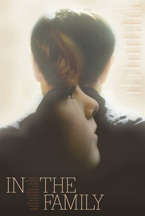 (In The Family is now available on DVD and Blu-ray.)
(In The Family is now available on DVD and Blu-ray.)
Independent filmmaking can be a thankless venture. Just ask Patrick Wang. As writer/director/star of In The Family, Wang put everything he had, quite literally, into his feature film debut. But when he submitted it to fests, he was met with rejection after rejection. Which isn’t uncommon, as that sort of thing happens all the time. Only here’s the thing: movies like In The Family don’t happen all the time. They happen very, very rarely, in fact. With his powerful, sprawling 169-minute drama, Wang has delivered one of 2011’s most ambitious American motion pictures—right alongside The Tree of Life and Margaret—that is set in an authentic South and has the emotional impact of a genuine modern epic. After finally landing festival slots at the San Diego Asian Film Festival, the Hawaii International Film Festival, and the Whistler Film Festival, Wang decided to take matters into his own hands, booking the film for a theatrical run at the Quad Cinema in New York City. The ensuing response by critics, who were finally able to see the film for themselves—as well as a recent Spirit Award nomination for Best First Feature—has proven that though it may take time, great films shine through the cluttered clouds (read Dave Boyle’s “Filmmaker Pick of the Week” HTN review of the film if you haven’t already). Recently, I sat down with Wang in a SoHo cafe for a long conversation, to discuss his birth as a filmmaker, his extraordinary In The Family, and his persistence in the face of so many baffling film festival rejections.
Hammer to Nail: If I’m correct, your creative career began in theater, not film?
Patrick Wang: Yes.
H2N: Can you talk about that first, before we get into your transition to cinema?
PW: It came relatively late in life. I started theater when I was in college. I just went to the theater, I thought it was very interesting. I’d watch. I’d volunteer at theater companies. And eventually I found my way into roles on stage.
H2N: Where was this?
PW: This was in Boston. I went to school at MIT. After MIT, I started a theater company. And that happened for a couple years. It was wonderful. You get to learn all the different departments. I learned a lot about design during that time. That’s kind of my formation into the world of drama, into working with actors. I directed actors for that theater company.
H2N: Was it the idea of In The Family itself that led you to cinema, or was it a broader urge?
PW: It started in Boston. At my last theater, I was in a short film there, and I enjoyed it. I enjoyed the process. It was something completely new and I love new things. So when I moved to New York, I moved partly for theater, and partly to explore television and film. And so I started doing more small productions, short films…
H2N: And this is acting?
PW: This is acting, but you get exposed to different things. One of the things I did when I first went to New York is the NYU—I forget what they call it—I think it’s the MFA in Screenwriting, they hire actors to come in and read scripts for their students. And I learned so much about screenwriting, watching those classes and participating in those readings. So you kind of obliquely, as an actor, get exposed to all the different aspects and departments.
H2N: So how many years of this kind of “on the ground film school” were there, before In The Family was born?
PW: That’s a strange path too. It was a couple—maybe three or four—years when I first moved to New York that I did those projects and learned a lot from them, from the people involved. And then I kind of left the arts for a while. I left theater, I left film, and it was really just two or so years ago when I started writing In The Family. I didn’t think I would produce or have anything else to do with it other than writing. I thought I would sell it. And then, at the beginning of 2010, I decided I could make it, and I would make it.
H2N: And was the trifecta decision made at that point, to act as well?
PW: They all kinda came in pieces. It was written first. And then, as may be familiar to a lot of filmmakers, you go through this painful process of presenting to producers where all those things you love are on the chopping block and all the clichés you tried to avoid are making their way into the conversation. So it was a very defensive kind of move to make it. To say, “Okay, this is why I’ll direct it.” And I decided to produce it also. My father had gotten very ill at the time, it was very sudden, and I think it was a wake-up call to my family, to myself. It was kind of like, you know, you can’t wait to start living. And I was looking for something meaningful to do. And I love the script, I love what it says about life, and I realized I could make it, and so I should. There was nothing to wait around for.
The acting came later. One of my producers convinced me to think about it. And I did some soul searching. I went through a process of auditioning myself—watching myself, giving myself direction—and then seeing if I could actually affect the direction. And after a couple rounds of that, I realized that I could. It would be a challenge, but it also comes with some advantages. You can do things like direct the other actors from within the scene. For a film like this, where you would spend most of your time, if it were another lead actor, communicating with that actor, it saves a lot of time for a short shoot.
H2N: As for the team you assembled. Were these people you met in your previous dabblings in production, or did your producer help with that?
PW: Most people were new. Now, the producer I had worked with before on some short films. And then a couple of the crew I knew from either working with or through this producer. But a lot of people were new. I’d never worked with any of the cast before. My DP [Frank Barrera] was new to me. He was from a recommendation. And I lucked out. [PW laughs] It was a beautiful relationship.
H2N: Did you do a big vetting process for your DP or did something just click when you met him, or was this the best option—not “best” in that way because that sounds wrong.
PW: One of the things that I think can stymie you is when you get fixated on what is the absolute best. I knew that there were very important elements of the big decisions, whatever they were, if we were hiring certain personnel. And we would keep searching until we knew we were very happy with who was in front of us. So I think I vetted more for work style and how they approached things than necessarily for the most experienced or the most accomplished, whatever that may mean for their field. And you just find people who are just the right personality—and also the right personality to work with a first-time film director. The type of people that understand there’s an asset in some of the ignorance that comes with that. And so when you have somebody who values that and can bring all their experience to kind of dovetail with wherever strange direction you’re leading them, it’s just a beautiful thing.
H2N: The rub with this type of filmmaking is that it’s never going to be perfect, it just never is, so at some point you have to just commit and set a date. Removing the actual financing from the equation, was there any one thing you were waiting for to make you feel 100% ready to dive in, or did it get to a point where you set a date and said that day one was going to happen on that day no matter what?
PW: I think the reason I was willing to wear all these hats is in January of 2010, a big part of the decision to say, “I am making this movie,” was also, “I’m financing all the movie myself.” And I also wanted to make sure that I went into it with the mindset that I’m ready to not make a penny; like not a penny in profit, just not a penny in income. I didn’t want to spend any of my time making decisions trying to protect—even if you think you deserve just a modest piece of the pie—just to not think about that at all. Make decisions for the film. And when I did that, I also set the date. I said, “Okay, we’re gonna shoot October 18th, we’re starting.” And I got nine months of pre-production. And I needed it. [both laugh] But it was beautiful. It’s uncommon, but it’s the only reason we have a movie of that quality to show for. With such a small budget and a three-week shoot.
H2N: Were you doing six day weeks?
PW: Six days.
H2N: When we were first emailing, we discussed the upcoming Edward Yang retrospective and you said that you were looking forward to catching up with his work because you hadn’t seen any of his films. This made me wonder about your movie watching history. Would you consider yourself a cinephile?
PW: I am very new to movies. I feel like if you watch a single, very accomplished movie, you can learn so much from it. So I feel like a single movie can be a huge education. There is some European cinema I really love. I love Tony Richardson, who is also from a theater background. And there is certain Bergman that I really like. I do really like Cassavetes. But there are all these names that have come up that I don’t know. And I’m looking forward to finding out. There are certain things about filmmaking that I didn’t know going in that I’m glad I didn’t know. Certain things, like we did a lot of long takes with kids, and apparently you’re not supposed to do that!
H2N: Maybe I’m jumping to a conclusion here, but based on what you’ve just said, I’m now wondering if your long-take approach was actually more directly inspired by your theatrical background as opposed to cinema. Would it be fair to say that?
PW: I think it was some sense of humility as to the tools you have. This idea that you can have multiple shots of the same scene, and that you can cut. I think that I didn’t take them for granted. And so I started from just a humble spot of saying, “Where do I really need this? What does it do for me?” And, “Can I get away without it?” So that when you use it, and the rhythm you use it at, is meaningful every time you do employ this tool. I think it comes more from kind of a minimalist perspective of trying to get your head around all these different things you can do and all the different strains that are running through the film, either in design or content. So it felt like I had to simplify some things because of how complex other things were. This is one of those things I learned after the fact: I was reading This Is Orson Welles, where he talked both about you have to feel like you’re discovering everything for the first time, whether or not it’s true, and then the other thing is that when you know where to put the camera, the scene just reveals itself.
H2N: How did you come to an understanding with your DP in taking this rather bold stylistic stance? Did he try to scare you off it, or was he excited by it, or was it something that developed between you two during your nine months of pre-production?
PW: We had five months together. And what we did is the very first month I sat down with him and I said, “We’re not gonna talk any visuals. I just wanna go through scene by scene, and talk about what’s the heart of the scene, what is in there, why is it there, what is being said, what’s not being said, why are people doing the things they’re doing?” So that we have this thing to come home to, whatever the visual style is, we have something to hang our hat on in all these scenes. And I love that he was so willing to go along with that. Then we went back to the beginning, and put together a rough shot list, talking about some basic design principles. And with those five months you can just keep going back, and something organically just starts to merge. If it’s really strong, it’ll spread its tentacles into another part of the film so that it all starts to become this thing. And you don’t have a name for it, but it develops its own language. And you need time to develop your instinct for that language. So that by the time we’re shooting, we can make really fast decisions in a consistent way. That was our basic process.
What Frank was really good about is he could tell me—he would feel obligated to tell me—“This is conventionally what would be done,” but he would respect whichever direction I went after that. And the other thing is whenever something bothered him, he was very good at identifying what the issue was, or assessing a situation. One of the things that I find on film sets is people are often reacting to things before they understand them. And so I really appreciated having a partner to assessing something with me. And also a partner where we developed a language together, not from working together, but from all this preparation. We also both love to be inspired on set. So you do all your work for your master plan so that you can abandon it confidently when you need to.
H2N: Now, as far as the “directing a child actor” question goes, we all know that’s a very risky proposition. Is this a case where those nine months of pre-production played a huge role, or was there development on the set when it came to his performance?
PW: Every actor is a little different. I think all of them loved rehearsal of some sort, and to some extent, but it was just different actors would need different amounts. And with the kid [Sebastian Brodziak], I wanted him to feel very comfortable around me, so some of the first things we did were we went to Coney Island, we went to the aquarium, we just spent some time together. Then we went into rehearsals, we went into exercises so that I could help focus him, vocally on the accent, and also just to give a little structure to when we were together, something we could launch into to get him in the mood. But he was like every wonderful actor in that he was incredibly intelligent, had this mind like a machine where you could tell him a dozen things and he could incorporate it all. He had a gift that, at the age of six—he was six when we shot—usually they tell you at that age kids are not very good at degrees of things. You can’t tell ‘em “a little of this” or “a little of that.” They need black-and-white. That wasn’t him at all. You could tell him, “A little less of that,” or, “Like you did it two takes ago,” and he could balance all that in his head. At the same time, he could invent something new. At the same time, he was very aware of what you were doing. He had all those things and then on top of it—and I think it’s the thing that sells the relationship and his role in the movie—is he just has this big heart. And you can’t fake that kind of love and compassion.
H2N: Did you know that right away when you saw him or did it take a few meetings to feel confident that he was the right one?
PW: There was something very special about him when he came in…
H2N: And he’s an actor?
PW: He’s an actor, yeah. I think this was his first feature film. He’s done these shorts, and he’s done these comedy shorts where kids reenact like TMZ and reality shows. [both laugh] He came in and there was a piece of me that was like, “You’re my kid!” There’s something so generous about him. And he was also one of the very few kids at six years old who could remember all his lines with ease. And had no trouble doing things again and again. And also had no trouble… you know, he does commercial work, and kids who do commercial work, there’s a certain register at which they deliver their lines and they perform, but I could move him away from that very easily. And I thought that was wonderful. He has real flexibility and a real awareness.
H2N: A miracle! [PW laughs]
PW: One of a series of miracles where you’re just like, “Wow, we lucked out.”
H2N: Forgive me if this question seems obvious, but why was it so important for you to set this film in Tennessee? Like, why not just set it in the New York town where you actually shot it?
PW: I think it started as, it was a place that was on my mind. My Argentine sister had just moved to Martin, Tennessee, with her husband. I’d never been to this town before, and I found myself just wondering about it a little bit. So it was on my mind. And I think I like it in the film—first of all it’s western Tennessee, so it’s not as isolated as something in the mountains or some smaller town maybe. It’s a good-sized town. And I feel like there are certain things that don’t get fair shakes in movies. One of the places being the South, and one of the places being towns of this size. And I also think that if we set it on the east coast, in a more metropolitan town or something like that, in some ways the elements become a little too easy for a certain type of audience. I think that having it in Tennessee makes it more likely that whoever is coming to see this film has some element that they’re uncomfortable or unfamiliar with. And as much as I’d like this to be a complex discussion about gay couples, gay parenting, gay rights, I would also like it to be a complex discussion about the South. Because it’s very interesting, the kind of things people say, that are not really written into the movie, but that are just part of the interpretation just because it’s set in the South. Like we were talking about before, where it’s not the absolute perfect thing, there were so many things about it that worked and that I liked that I went with it.
H2N: I have to ask you about your accent. Like, pinning that down with confidence as a performer, more than even directing others, that is just such an incredibly dangerous and risky and difficult thing to do and most of the time it goes soooo wrong. But the way you pulled it off here, it set an immediate tone of assurance.
PW: Well, I’m from Texas, and so there’s a bit of the Southern rhythm in my head. I’m used to hearing it. But it’s a good question because I went through a series of maybe fifty different accents for this character, and I would start at a place that I loved, but because of that last deposition scene, where you’re listening to this guy talk for half an hour, there are certain accents you just can’t listen to for half an hour! [PW laughs] Or the half an hour becomes forty-five minutes. So you’re looking for something that can fit the range of emotions and the range of thoughts. Brian Murray and I were talking about this, and we both approach accents as if it’s a thinking pattern instead of a speech pattern. And so we gave ourselves some liberties. It’s not like a textbook accent you’ll find, but I think it fits the personality. And it also, I’m stunned that there’s all these movies about a place where everybody talks the same. [PW laughs] You just don’t find that anywhere!
H2N: Even in the South.
PW: And even within a family! People talk differently, there are different personalities. Especially with the background that the character has, having parents from different parts of the South, and influences from different places, it gives you some liberties. I like those liberties. But I’m glad, at the same time, that people who are either from the South or who have a sensitivity to it are very happy, that it sounds authentic to them.
H2N: For a first-time filmmaker, your “don’t try this at home” checklist is pretty insane! Knowing what you now know, and having some measure of remove, do you find yourself looking back and saying, “What was I thinking?!”
PW: Absolutely. Some of it was ignorance and some of it, you know it’s gonna be hard, even if you’ve never done it before. You know certain things are just treacherous ground. And so you have to work a little bit harder and you have to be more careful. But I got such a thrill from the things that were so tough about it. I loved that, you know, we were one week into the shoot, and I don’t think anyone believed we could finish the shoot in two more weeks! [PW laughs] And I looked at things and I’m like, “No. I see. I see the path. There’s not a lot of room for error, so we just can’t make a lot of errors.”
H2N: Guiding that precarious ship.
PW: It’s exciting. It’s really exciting.
H2N: Does the finished 169-minute film represent your script very closely, or did things change dramatically along the way?
PW: It’s very close. We shot a white script, so there weren’t a lot of rewrites, and I was pretty sure about structure and other things. There’s maybe ten minutes cut from the script, which I’m disappointed in, because I should have seen some of those scenes should have been cut to start with. But this is the movie. I think a lot of the feedback I got from people who were worried about the movie and its life, were, “Oh, we’ve got to get rid of some of these other things, we’ve got to get it down to a shorter length.” And I think it becomes a little more like every other movie when you do that. Particularly in how easy and obvious the path is of where the character goes and what has to happen. I think that the idea of not knowing, and the idea of false turns—basically not cutting too close to a plot film—is a lot of what makes this movie work.
H2N: It’s perhaps too easy to envision the Hallmark or Lifetime version of this.
PW: And it’s a very thin line. Sometimes it’s just this one scene or this one moment that separates you from something that’s sentimental or something that’s easy.
H2N: Were you conscious of that during production, like did you find yourself having to shift things to make sure you hadn’t tipped over that edge?
PW: Yeah. You can see it in some of the design. I just put some distance. Moments where it could become very sentimental, I tend to design a little wider, or indirectly, so that the person experiencing the more extreme event, we’re not on them directly. We’re seeing more of a reflection somehow.
H2N: And that’s never more evident than in the film’s early gut-punch of a turn, when we’re not even inside the hospital room, let alone seeing the character’s face, for his reaction.
PW: That was just a combination of all sorts of things. First, you don’t want to be sentimental, and one way to keep from that is not being straight on the character. But then I wanted to add in a song, which is the other direction and dangerous territory, but we stripped it down so that it’s acapella and it’s kinda rough sounding. And then there’s accidents too, like this beautiful thing happened where once we went outside of the hospital, we got this reflection of the cars going by. At first, somebody was like, “Do we need to control the traffic?” And I was like, “No!” [both laugh] “Let them come!” It’s a combination of certain things you design in direction, and then accepting these happy accidents as they come along, and then you get lucky in the balance of it all.
H2N: Okay, let’s skip to the point where the film is finished. It’s something you are excited about and proud of and are ready to show the world. Were you submitting blindly to festivals and just hoping and trusting that screeners and programmers would appreciate it?
PW: At the beginning, we were doing that. I think there were only one or two festivals where my producer had connections and tried to make the committee aware of the film. But otherwise, we trusted that at least somebody would screen it somewhere along the way and that the quality of the film would speak for itself.
H2N: And are we talking January 2011 for the beginning of your submission cycle?
PW: Our first rejections were from Tribeca and Cannes, so very early in the year.
H2N: Were you submitting rough cuts or a relatively finished film?
PW: We sent one, it was a picture lock but it was with temp sound and before color correct.
H2N: But a picture lock.
PW: Yeah. We sent out one of those, and everything else was the finished film.
H2N: I’m just trying to wrap my brain around all of this, because as discouraging and, frankly, disappointing, as it is to learn that your film was rejected from so many film festivals, the fact remains that people are finally discovering it. So I do think this story has a happy ending! But when it comes to the frustration, I tend to take a more Zen approach with my filmmaking and really try hard not to get bothered by anything that isn’t in my control. Have you gotten pretty bitter or angry about things along the way?
PW: I think that’s true when it comes to elements you can’t control, like the festival decisions that get made or how distributors make their decisions, but this thing that has happened, and I think it really comes from how the Times review put a piece of narrative behind the film. And I think that’s wonderful. Because it is very meaningful to people, and suddenly, because of that and because of some other things, we got some breaks. But it’s a very precarious road to that! It was hardly a sure thing. And there’s other people who haven’t been so fortunate, who are very likely doing wonderful work. It kills me, but the good stuff always seems to have the hardest time making it and needs the most support. But, yeah, it thrills me to no end that people find this encouraging. And especially when this comes with a sense of community. That is what has made me so excited, that I’m seeing filmmakers show up for no other reason than they heard about the movie. That I see critics coming who haven’t been assigned to the film that are coming to see it. It’s wonderful to see that kind of excitement and that kind of community coming out of it.
H2N: At what point did you decide to not wait for the festivals to wake up—I know you were accepted into festivals, of course—and decided to regroup and take a different approach?
PW: I think basically when you get the message! [both laugh] You know, any single festival or any single distributor, you never know how they make their decisions, and I’d never presume to tell them how to make their decisions. But when they come en masse and they come consistently, and you suddenly have the numbers that tell you, “Okay, this is what’s going on,” and your energies doing this will likely lead to similar things, then it’s time to move on to the next phase. And it gets discouraging as you start running out of those phases. But I thought, these last few we were down to, you know, put it in front of audiences and let audiences say something about it. Put it in front of critics, let them say something about it. And then the very last one, which is actually the most recent news, is, you know, put it in front of the nominating committee for the Spirit Awards, and see if they’ll say something about it [In The Family did, in fact, receive a nomination for Best First Feature]. If we had gone through all those phases with no one saying anything positive, I’m not sure what else we would have done! [PW laughs] But you kind of go through those phases, and you hope it speaks to someone. And even though it’s towards the end—you always like it to be earlier, it was a lonely half a year [PW laughs], but it’s not lonely now. I love that this film, for a multitude of reasons, means things to different people.
H2N: There’s still quite a ways to go for this film, so I don’t want to talk about it like it’s sitting in a graveyard somewhere [PW laughs], but I’m interested to know if you feel like you’ve caught the filmmaking bug, or if you found it too draining and are looking forward to returning to the stage, perhaps.
PW: That’s a good question. When I made this film, I made it thinking, “I don’t know if I’m ever gonna make another film.” I wasn’t worried about a career or anything. I just wanted to make this one film. But there is a part of me that definitely has the bug, and that it felt just so beautifully natural when I was directing. It was just the time of my life. In the lonely six months earlier this year [PW laughs], I wrote a couple scripts, and so I have a couple scripts ready to go. But this next year, my head is in—you know, without a distributor—is in finding a way to get people to see this. To get them to see it in a theater. I know that this year there’s not gonna be a DVD. I wanna look for theaters to play it in. We have prints. We’re gonna take it around the country. Some theaters have already gotten in touch with us. We have plans for how to get into some others. When a certain opportunity shuts down, you look at the things that come with this new mode of working. Without a distributor, yeah, there are certain things we can’t do, but in talking to theater owners and talking to film professors who want to bring us to their colleges or whatever, it becomes much more personal and you get to be there with your audiences and really understand how the film works on them and to hear their reactions. It becomes much more personal, which just feels right for this movie.
— Michael Tully







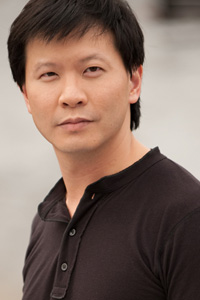
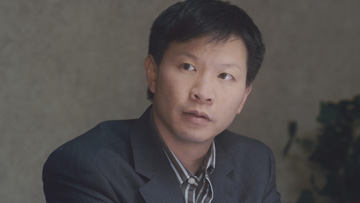
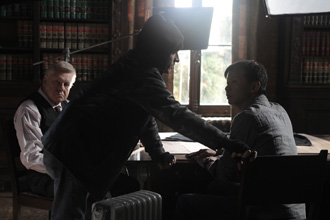
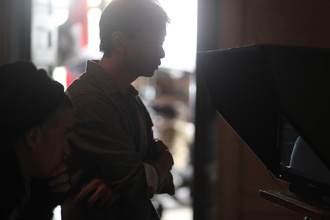
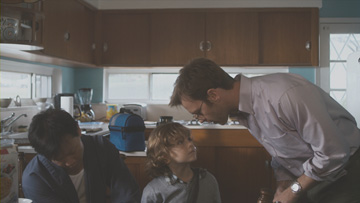
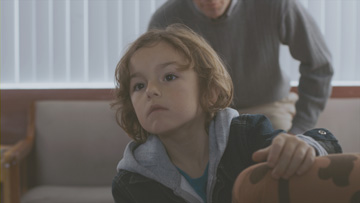
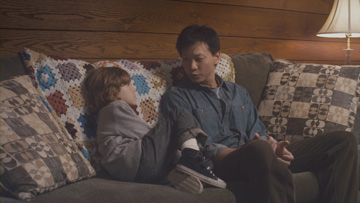
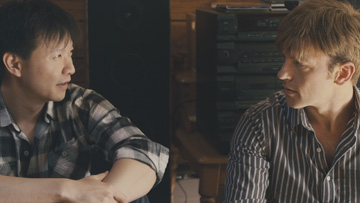


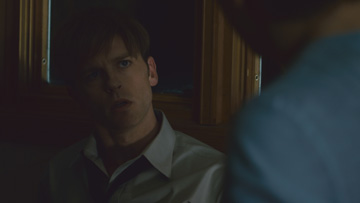
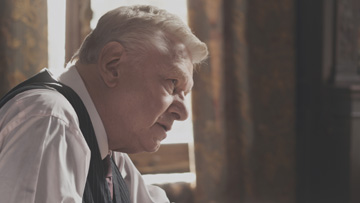



Michael Guillen
Great interview, Michael. I’m glad to see a groundswell of support for this remarkable feature.
Pingback: THE 2011 HAMMER TO NAIL AWARDS – Hammer to Nail
Michael-Alexander Jacob Devane
Patrick Wang did an excellent job on In The Family. He presented the audience a life in upheaval with one of the most touching stories (gay or straight) that I’ve ever seen or been told. Joey Williams is the every man he drinks beer, works with his hands, and loves his son. Nothing could be simpler. http://www.imdb.com/title/tt1845804/
Boblocke
I can’t wait to see it. Sacramento? Will it come here?
Bob Locke
Alcuin73
Lovely film. Saw it at the Galway film Fleadh. Mr. Wang is indefatigible.
Bob Quinn
Chai Feldblum
I just saw this film today at the Rehoboth Film Festival. it was absolutely, positively amazing.
Chai Feldblum
I just saw this film today at the Rehoboth Film Festival. it was absolutely, positively amazing.
Chai Feldblum
I just saw this film today at the Rehoboth Film Festival. it was absolutely, positively amazing.
Tindle
I watched it on a DVD as I am on an AWARDS NOMINATING COMMITTE. I didnt know anything about it. I thought it was devastating … in a good way, lol. Terrific accomplishment by all involved